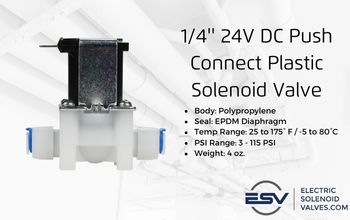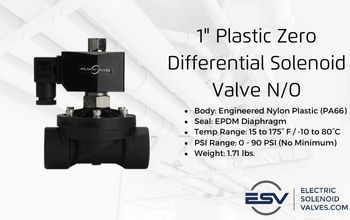Mar 25th 2024
When to Choose a Plastic Solenoid Valve
Solenoid valves (SVs) are electromechanically operated valves that control the flow of liquids, gases, and steam. They are widely used in various industries, including manufacturing, automotive, and medical. Solenoid valves come in various materials, including brass, stainless steel, and plastic, each with its own unique advantages.
In this blog post, we will discuss the advantages, common applications, and different factors to consider when choosing a plastic solenoid valve. Should you have any questions after this article, our team is always available to answer your questions.
Advantages of Plastic Solenoid Valves
Chemical Compatibility and Corrosion Resistance:
Plastic valves are commonly sought out for their exceptional chemical compatibility and corrosion resistance. Compared to metal valves, these resistant properties make them ideal for chemically aggressive environments. They are inert to corrosive substances, resistant to acids, bases, and organic solvents, and perform well in harsh conditions.
That being said, the different types of plastics used to make these valves and their seals may still be susceptible to certain chemicals. Consult a specialist, or use our free chemical and material compatibility database to determine if your media will be safe for any particular valve.
Lightweight Advantage
Plastic solenoid valves are significantly lighter than their bulky metal counterparts. This translates into easier installation, less strain on your piping system, and lower shipping costs. If you need valves for portable equipment, have to squeeze them into tight spaces, or just want to make your installer's life easier, plastic would be the best choice.
Comparing weights of plastic solenoid valves to other valves:
- 1/4" 24V Plastic Solenoid Valve - 4 oz.
- 1/4" 24V Brass Solenoid Valve - 10 oz.
- 1/4" 24V Stainless Steel Solenoid Valve - 10 oz.
Cost-Effectiveness
Plastic SVs often cost significantly less than those made from brass or stainless steel. For projects where you need to watch your budget closely or where you need a lot of valves, these cost savings can make a big difference. Opting for plastic valves means you can allocate funds to other parts of your project or even free up money to upgrade elsewhere.
Insulation Properties:
Plastic naturally provides insulation. That means plastic solenoid valves can be useful in electrical systems where you want to minimize interference. They can also be beneficial in situations where preventing heat transfer through the valve itself is important. This is a huge benefit for many automotive and medical products.
Ideal Applications for Plastic Solenoid Valves
Plastic solenoid valves have become indispensable in many industries. There are countless applications where they are the best valve to use. The following provides just a few examples of some industries that rely heavily on plastic SVs.
Water Treatment and Management:
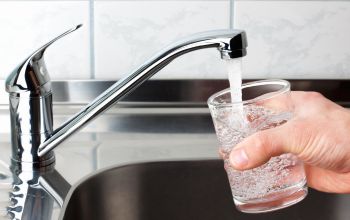
From purifying drinking water to managing wastewater, plastic valves are used all throughout the water industry. You'll find plastic valves controlling flow, dosing chemicals, and keeping water systems running smoothly at every stage. Their resistance to corrosion makes them ideal for handling everything from the chlorinated water in your swimming pool to the purified water in your drinking system. Plastic valves are also essential for water purification systems, helping to be compliant with strict EPA drinking water standards.
Chemical Processing:

Those working in chemical manufacturing know that the stakes are always high, and the margins for error are slim. Plastic solenoid valves, thanks to their non-reactive nature, are a valuable piece of chemical processing systems. These valves are able to stand up against most potent chemicals, harsh acids, bases, or other aggressive substances.
Aquariums and Aquaculture:
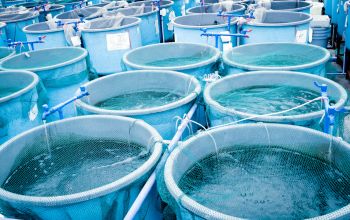
For the aquatic life enthusiasts out there, maintaining perfect water conditions is crucial. Plastic solenoid valves are used to manage this water flow, oxygenation, treatment, and filtration. Their resistance to saltwater and biological materials helps to create a healthy environment for marine life to thrive in.
Food and Beverage Industry:
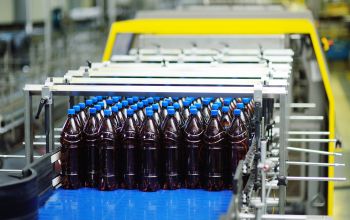
In the food and beverage industries, maintaining a sanitary and sterile environment is incredibly important for maintaining the safety of the final product. Plastic solenoid valves are often chosen in these industries since they are non-toxic and easy to clean. From managing the precise dispensing of flavors and additives to advanced beer brewing technology applications, these valves make sure your products come out delicious and contaminant-free.
Considerations and Potential Limitations
While plastic solenoid valves are incredibly versatile, it's important to be aware of their limitations to make informed choices:
Temperature and Pressure Limits:
Perhaps the biggest tradeoff for the cost savings and chemical resistance of plastic valves would be their susceptibility to higher temperatures and pressures. For example, this plastic zero differential solenoid valve made of Engineered Nylon Plastic (PA66) can handle temperatures of 15 to 175° F and pressure ranges up to 60 PSI, while this stainless steel steam solenoid valve can withstand temperatures and pressures of 32 to 356° F and 0 - 90 PSI.
These valves have specific operational limits when it comes to the heat they can handle and the pressure they can withstand. Different types of plastics (like valves made with Polypropylene or Engineered Nylon Plastic (PA66) valves) also have their own varying heat tolerance and can become less sturdy under extreme pressure compared to others.
Always check the specifications of your plastic valve to make sure its temperature and pressure ratings align with the specs of your system.
Material Compatibility:
Even though plastic is generally more compatible with a wider range of chemicals than metal valves, they still can’t resist everything. Some plastics may degrade when exposed to certain chemicals, leading to leaks or valve failure. Double-check the specific plastic valve materials (and internal parts) to make sure it is compatible with the liquids or gasses it will be controlling.
When To Choose Metal Valves
Choosing the right solenoid valve material is a bit like picking the right tool for a job. Plastic solenoid valves are fantastic for a wide range of applications, thanks to their versatility, cost-effectiveness, and chemical resistance. However, sometimes your best option would actually be a valve with a metal body.
There are instances where metal valves are going to be better. Brass or stainless steel will usually be your choice for applications involving higher temperatures, higher pressures, or where ruggedness is the top priority.
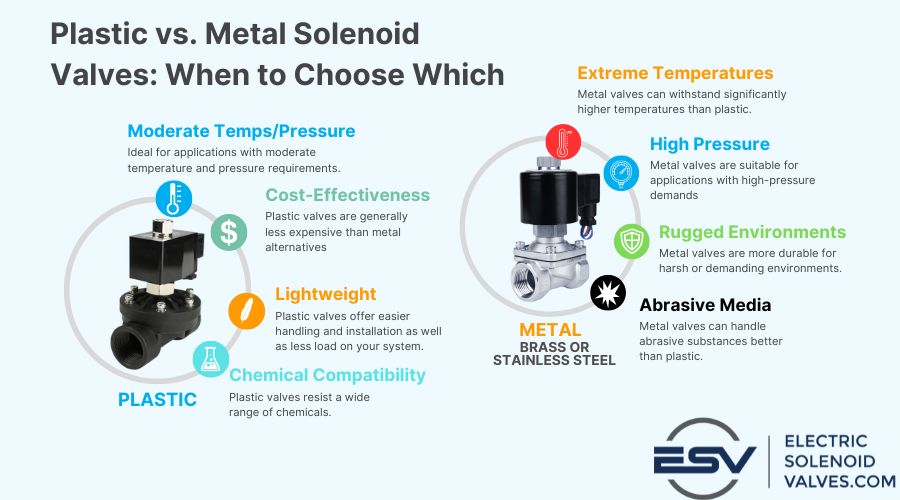
Conclusion
Choosing the right solenoid valve comes down to carefully considering your specific needs. Plastic solenoid valves offer numerous advantages in many situations. By understanding their strengths, limitations, and ideal applications, you can make an informed choice that best suits your system for efficiency and longevity.
Need help deciding if plastic solenoid valves are right for you? Get in touch with our valve experts by phone, email, or online chat. We're ready to answer your questions and guide you to the perfect solution.


